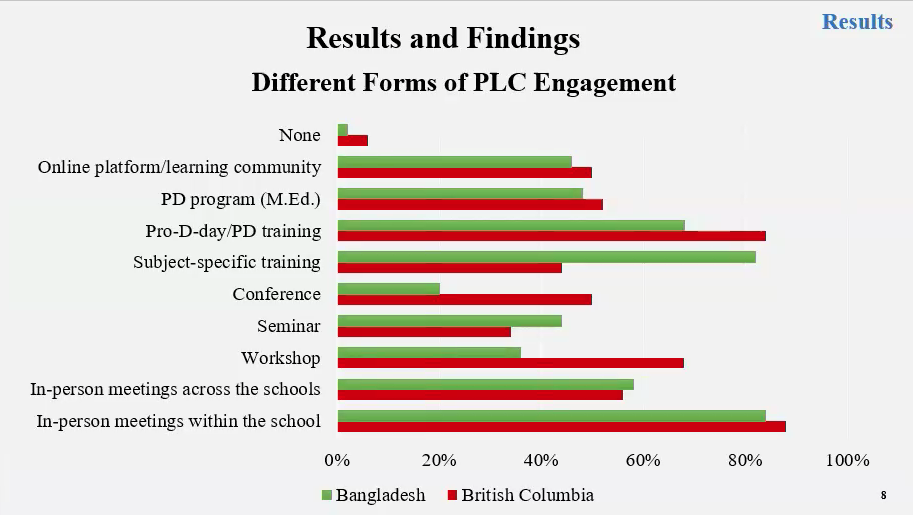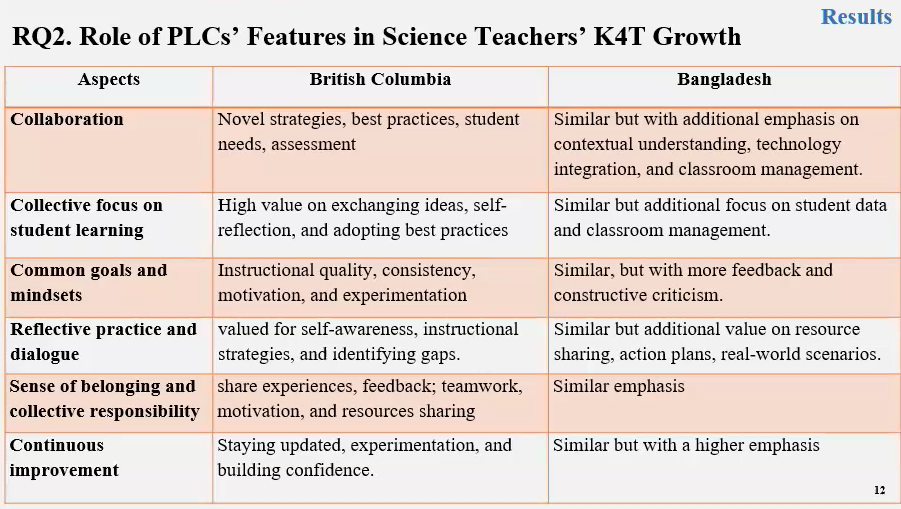Summary of SyMETRI Meeting: June 24th, 2024 by Qiaochu Xu
Presenter/Guest Speaker: Shahidul Islam from Department of Curriculum and Pedagogy, University of British Columbia
Date: June 24th, 2024
Host: Dr. Cynthia Nicol
At the SyMETRI meeting on June 24th, 2024, Shahidul Islam shared with us about his master’s research which endeavoured to contextualize gaps in our understanding of Professional Learning Communities’ (PLCs) unique features. His study focuses on secondary science teachers in British Columbia and Bangladesh, examining key PLC features, their impact on Knowledge for teaching (K4T) growth, challenges faced by teachers, and how PLCs help address these challenges.
His study employed an explanatory sequential mixed-method design, starting with a survey of 100 participants (50 per region) through purposive sampling, followed by semi-structured interviews with 10 participants (5 per region) using convenience sampling. Data analysis included descriptive statistics for quantitative data and thematic analysis for qualitative insights.
Shahidul shared varying degrees of responses to the salient PLC features in both regions. Bangladeshi teachers emphasize features like student focus, shared goals, reflective practices, fostering belonging, sharing resources, continuous improvement, open communication, and data-informed decision-making more than their counterparts in BC. However, British Columbian educators value collaborative problem-solving and mutual respect comparatively more than Bangladeshi educators. The biggest discrepancy is in distributed leadership skills, which are less valued in BC compared to BD. Both regions benefit from PLCs’ resource sharing, new teaching strategies, understanding of student needs, technology integration, self-reflection, and staying updated on educational trends for K4T growth.
On the other hand, Bangladeshi teachers face more challenges, such as lack of technology access, student readiness, pedagogical inertia, blending technology, designing assessments, and lack of support, while BC teachers moderately agree on these. Technical issues, limited knowledge, evolving technology, and lack of confidence are almost equally addressed in both regions. PLC participation helps overcome these challenges through networking, collaboration, technical assistance, affordable tech solutions, resource sharing, confidence building, and tailored instruction, enhancing teaching practices and embracing evolving pedagogies. By leveraging the benefits of PLCs, educators can enhance teaching practices, meet the needs of diverse learners, and embrace the rapidly evolving technology-enhanced pedagogies.
Here are some slides from his presentation:
Shahidul provided valuable insights from his research, highlighting key features of Professional Learning Communities (PLCs), their challenges, and how these vary between teachers in Bangladesh and British Columbia. His contributions shed light on potential strategies for designing and implementing effective PLCs for teachers moving forward. During the SyMETRI meetings, members engaged in thorough discussions about the data collection process, the recruitment of participants, and the methods of data analysis. The discussions also addressed strategies for overcoming the challenge of recruiting sufficient candidates for surveys. Further discussions focused on the best approaches to inviting participants for interviews, ensuring a diverse and representative sample that would enrich the research findings. These dialogues are instrumental in ensuring the robustness and reliability of our data collection and analysis processes.
Bio
Shahidul Islam is a MA student in the Department of Curriculum and Pedagogy here at UBC. Shahidul just defended his thesis June 13th. Congratulations Shahidul!


